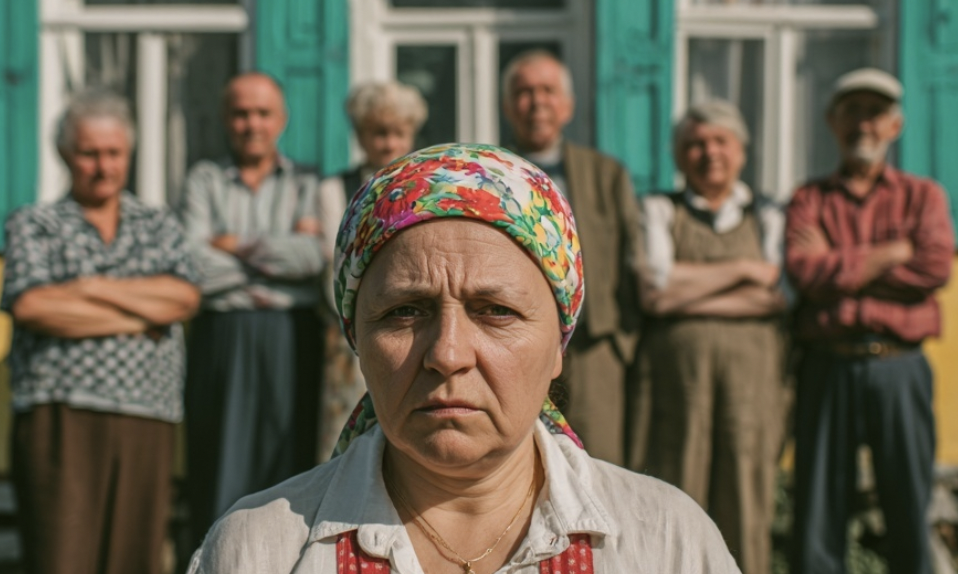Galina Petrovna heard the familiar sound of car doors closing and involuntarily tensed. Friday, half past six in the evening. Like clockwork. She didn’t even approach the window—she already knew what she would see: Nikolai’s blue Logan, from which his whole family was already climbing out, and behind it, Svetlana’s battered Lada with her brood would pull up. The weekend at the dacha was beginning.
“Aunt Galya!” came the clear voice of her niece from the yard. “We’re here!”
Galina Petrovna put down her book and slowly rose from her armchair. Just an hour ago she had settled comfortably on the veranda with a detective novel and poured herself some tea—it was shaping up to be a perfect evening for a lonely fifty-eight-year-old woman. Now she would have to fake joy at the unexpected visit, although “unexpected” was only nominal.
“Hi, Galya!” Nikolai was the first to burst into the house without taking off his boots. Behind him followed his wife Marina and their two children. “How are you? How’s your health?”
“Fine,” Galina Petrovna replied briefly, watching as ten-year-old Maxim was already inspecting the contents of the refrigerator. “Are you staying long?”
“Till Sunday, as usual. The weather’s good, the kids missed the dacha. And it’s more fun for you with us here, right?”
“More fun.” Galina Petrovna nodded and went to put the kettle on. A minute later, Svetlana came into the house with her husband Sergey and their three children. The house instantly filled with voices, stomping feet, and sounds of moving furniture.
“Aunt Galya, do you have anything to snack on?” Marina asked, settling in the kitchen. “We’re hungry from the trip.”
“We’ll see,” Galina Petrovna opened the fridge and looked inside. Chicken she had thawed for tomorrow’s lunch, some sausage, eggs, vegetables for a salad. Enough for herself—more than enough. For eight people—clearly not enough.
“Is there any bread?” Sergey asked.
“Half a loaf.”
“Mama, I want to eat too!” whined seven-year-old Anya, Svetlana’s daughter.
“Soon, sweetheart, Aunt Galya will feed us.”
Galina Petrovna felt the familiar tension in her shoulders. Feed them. Naturally. Who else?
“I’ll go to the store,” she said, taking off her apron. “Need to buy more groceries.”
“Do you want me to go with you?” Svetlana offered without much enthusiasm.
“No need, I’ll be quick.”
The local store was a twenty-minute walk away. Galina Petrovna trudged along the country road, mentally calculating the upcoming expenses: bread, milk, sausages for the kids, something for breakfast, fruit. At least one and a half thousand rubles. And that was only for tonight and tomorrow morning.
At the store, she ran into her neighbor Anna Dmitrievna.
“Galya, the relatives came again?” she looked knowingly at Galina Petrovna’s full shopping cart.
“They did,” Galina Petrovna replied briefly.
“Every weekend, like clockwork. They could bring something once.”
“Come on, they’re family after all.”
“Family, family…” Anna Dmitrievna shook her head. “I have relatives too, but at least they ask if I need help.”
On the way home, Galina Petrovna thought about her neighbor’s words. Indeed, over all these months—since May—it was the first time none of the guests had asked if she needed help with groceries. They came as if to their own home, where everything appeared in the fridge by itself.
At home, the usual scene awaited her: children running around the yard, men smoking on the veranda, women sitting in the kitchen drinking tea.
“Galya, you took a long time,” Marina noticed. “We started to worry.”
“There was a line at the store,” Galina Petrovna lied and began unpacking the bags.
“Oh, sausages!” Svetlana was delighted. “Just right for the kids.”
“And I got fruit too. Good. Maxim kept asking for apples the whole way.”
Galina Petrovna was silent, slicing the bread. Asked for apples—they could have bought them on the way.
The evening followed the usual script. The children were noisy, demanding attention, playing games inside the house. The adults drank tea and discussed the news. Galina Petrovna cooked, set the table, washed the dishes. By ten o’clock she was exhausted.
“Galya, where will we sleep?” Svetlana asked.
“There’s a sofa in the living room, a folding bed on the veranda. As usual.”
“And the kids?”
“Sleeping bags in the closet. Make yourselves comfortable however you like.”
Galina Petrovna went to her bedroom and locked the door. Voices, children’s laughter, and creaking floorboards could be heard through the thin walls. She only fell asleep around midnight.
In the morning, she was woken at half past six. The children woke up early and demanded breakfast.
“Aunt Galya,” Marina quietly knocked on the door. “Sorry to wake you. Maxim got up and woke everyone.”
“I’m coming,” Galina Petrovna groaned.
Breakfast, lunch, afternoon snack. An endless stream of “What’s there to eat?” and “The kids want something sweet.” By Saturday evening, the fridge was empty, and she had to go to the store again.
“Maybe I’ll go?” Nikolai offered, hesitantly.
“No need, I know what to buy.”
“Want some money?”
“No,” Galina Petrovna waved him off, though she still had some money in her wallet.
Sunday was especially hard. The kids were cranky, the adults discussed plans for the next weekend.
“Maybe next Friday we’ll come earlier?” Svetlana suggested. “We could leave work at about four.”
“Great idea,” Sergey agreed. “More time to rest.”
“Maybe we could come during the week sometimes?” Marina added. “The kids are home anyway in the summer.”
Galina Petrovna was silent, stirring the soup. Come during the week too. Wonderful.
“Aunt Galya, what will we have for dinner?” Maxim asked.
“Soup.”
“And what else?”
“Nothing else. The groceries are finished.”
“How are they finished?” Marina was surprised. “We went to the store yesterday.”
“They’re finished,” Galina Petrovna repeated.
“Then we’ll go again. The kids need to eat.”
“You go yourselves.”
There was a pause. Galina Petrovna continued stirring the soup, feeling the surprised looks on her.
“What do you mean, ourselves?” Svetlana asked again.
“Exactly that. The store’s open, you know the way.”
“But we don’t know what to buy…”
“Buy what you eat. Milk for the kids, bread, something for dinner.”
“Galya, you’re kind of…” Nikolai began.
“What?”
“Well, I don’t know. Strange. You always used to go yourself.”
“I used to be a fool,” Galina Petrovna said calmly.
The silence became even more tense. The children stopped playing and listened to the adults’ conversation.
“Aunt Galya, are you angry?” Anya asked timidly.
“No, sweetheart, I’m not angry. Just tired.”
“Tired of what?” Sergey didn’t understand. “We help. We wash the dishes, clean up after ourselves.”
“You clean?” Galina Petrovna turned to him. “Sergey, look around. Dishes in the sink, towels on the floor, crumbs on the table. Is that cleaning?”
“Well… we’re guests, we relaxed a bit.”
“Guests. Every weekend. For three months now.”
“Mama, I’m hungry,” Svetlana’s youngest son whined.
“Soon, Petya. Aunt Galya, what’s wrong with you? We’re not enemies. Family.”
“Family,” repeated Galina Petrovna. “Fine. Family. Tell me, Sveta, how much did you spend on groceries this weekend?”
“How much? Uh… I don’t know. Why?”
“I know. Three thousand four hundred rubles. For two days. That’s my pension for a week.”
“But we didn’t ask…”
“Didn’t ask?” Galina Petrovna set down the pot. “‘Is there anything to eat?’, ‘The kids want something sweet,’ ‘The bread is finished.’ Aren’t those requests?”
“Well, we thought…” Marina began.
“What did you think? That I print money? That groceries appear in the fridge by themselves?”
“Galya, don’t be like that,” Nikolai tried to calm her. “We didn’t know it was hard for you. You should have told us.”
“Told you? Fine. I’m telling you: it’s hard. Every weekend I spend half my monthly budget on you. Every weekend I cook from morning till night. Every weekend I clean up after eight people. I’m fifty-eight years old, a widow, and I want to rest at the dacha, not run a boarding house.”
The children quieted down. The adults exchanged looks.
“Aunt Galya,” Svetlana said quietly. “We didn’t mean to… We’re just used to it. We thought you liked having us.”
“Having us?” Galina Petrovna smiled bitterly. “Sveta, have you ever invited me to your dacha? Or to your place in the city?”
“Well… our apartment is small…”
“And mine is big? This is a small house, by the way. One room, a vestibule, and a veranda.”
“Aunt Galya, is there anything to eat?” Maxim couldn’t stand it.
And then Galina Petrovna exploded.
“Came empty-handed—drink water!” she shouted, turning to the boy. “Here’s water, here are glasses! There’s nothing else!”
Dead silence hung in the air. Maxim stepped back to his mother. The other children shrank.
“Galina Petrovna,” Marina said coldly, “what is this tone? Why are you shouting at a child?”
“Because I can’t anymore!” Galina Petrovna sat down on a stool and covered her face with her hands. “Do you understand? I can’t anymore! Every Friday I hear your cars and get a migraine. Every Friday I realize the weekend is over before it even started. I plan to read, work in the garden, just sit with tea—and instead I become a cook and a cleaner.”
“But we don’t force you,” Sergey said confused.
“Don’t force me? What do you call this? You come without asking if it’s convenient. You settle in without asking if there’s space. You eat without asking if there’s food. And when there isn’t any, you look at me like it’s my fault.”
“We thought you were glad to see us,” Svetlana muttered.
“Glad? I was glad the first time. The second. Maybe the third. But now I’m afraid of the weekends. Understand? Afraid!”
Galina Petrovna got up and walked around the kitchen.
“Do you know what I do on Thursday evenings? Make a shopping list for the weekend. Calculate how much money I need. Plan the menu. Like I run a café, not a dacha.”
“Galya, we didn’t know…” Nikolai began.
“Didn’t know? Or didn’t want to know? It was convenient for you not to know. You have a free dacha, free food, a free cleaner. Why change anything?”
“But we’re family,” Svetlana repeated. “Relatives should help each other.”
“Should they?” Galina Petrovna looked at her. “Fine. Then help me. Here are the bills for electricity, water, gas. Let’s split them. Here are the store receipts. We’ll split those too. Here’s a list of chores. Let’s divide them among everyone.”
“That’s stupid,” Marina objected. “We’re guests!”
“Guests,” Galina Petrovna repeated slowly. “Every weekend. Two days at a time. For three months now. You’re not guests, you’re lodgers.”
“Mama, when will we go home?” Petya whispered.
“Exactly,” said Galina Petrovna. “When will you go home? And when will you stop coming here?”
“What?” Svetlana didn’t understand.
“I’m asking you to stop coming. Find another dacha. Another feeding trough. Another Aunt Galya.”
“You’re kicking us out?” Nikolai asked, stunned.
“I’m asking you to respect my desire to rest at my own dacha. Alone.”
“But we’re family!” Marina exclaimed.
“Family that’s been using my hospitality for three months and hasn’t once asked if it’s hard for me. Family that eats my food and doesn’t think about the fact I spend my last money on it. Family that turned my dacha into their dacha.”
“Galya,” Nikolai said quietly, “we really didn’t mean…”
“Exactly. Didn’t mean to. For three months you didn’t think. I thought. Every Friday I thought about where to get money for groceries. Every Saturday I thought about how to feed eight people. Every Sunday I thought about when you would finally leave.”
“We could…” Svetlana began.
“Could what? Bring sandwiches next time? Wash the dishes? Give money for groceries? Too late. I’m tired of being convenient. Tired of being the kind relative who’s always happy to have guests.”
“But where will we go?” Marina asked helplessly.
“I don’t know. Rent a dacha. Buy a plot. Visit other relatives. That’s not my problem.”
“Aunt Galya,” Anya began to cry. “We won’t come to you anymore?”
Galina Petrovna crouched before the girl.
“Anya, if your mom and dad call and make arrangements, if they bring food for themselves and you, if they help around the house—then come. But not every weekend. And not for two days.”
“That’s impossible,” Sergey muttered. “Calling every time, asking for permission…”
“Impossible?” Galina Petrovna was surprised. “I thought that’s called good manners.”
“Mama, let’s go home,” Maxim asked.
“Yes,” Galina Petrovna agreed. “Go. Now. Don’t wait till Sunday.”
Packing up was done in deadly silence. The children were quiet, the adults exchanged looks but no one dared say anything. Galina Petrovna stood by the window and looked out at the garden.
“Galya,” Svetlana approached her. “We really didn’t want…”
“I know. Just go.”
“Maybe we can talk calmly? Find a compromise?”
“No. I’ve said everything.”
Half an hour later, the cars left. Galina Petrovna was left alone in the house, where everything reminded her of the recent guests: crushed couch cushions, crumbs on the table, a forgotten child’s toy in the corner.
She slowly walked through the house, opening windows. Then she sat in the armchair on the veranda, took up her book, and tried to read. It didn’t work—the lines blurred before her eyes.
But for the first time in three months, the house was silent. Real, complete silence. And for the first time in three months, Galina Petrovna realized that tomorrow—Saturday—she could wake up whenever she wanted. Eat what she chose for breakfast. Spend the day as she wished.
She closed the book, leaned back in the chair, and smiled. For the first time in a long time.
The phone rang that evening.
“Aunt Galya?” Svetlana’s voice sounded uncertain. “It’s me, Sveta.”
“Listening.”
“We thought… maybe we really were wrong. Maybe we can start with a clean slate?”
“Sveta, I’m tired. Very tired. I need time.”
“How much time?”
“I don’t know. Maybe till autumn. Maybe till spring. Maybe forever.”
“But we’re family…”
“Family,” Galina Petrovna repeated. “Only I forgot about that three months ago. When I became not a relative, but the service staff.”
“Aunt Galya…”
“That’s enough, Sveta. Let’s end the conversation. I need to rest.”
She hung up, turned off the phone, and went out to the garden. The summer evening was warm and quiet. Crickets chirped somewhere, jasmine and freshly cut grass scented the air. Galina Petrovna sat on the bench near the apple tree and for the first time in a long while felt that the dacha was hers again.



